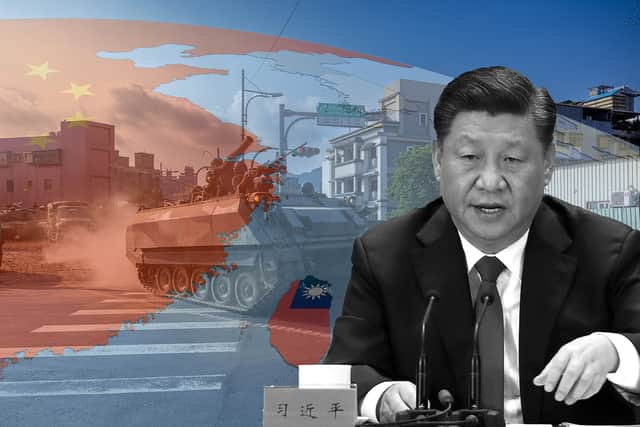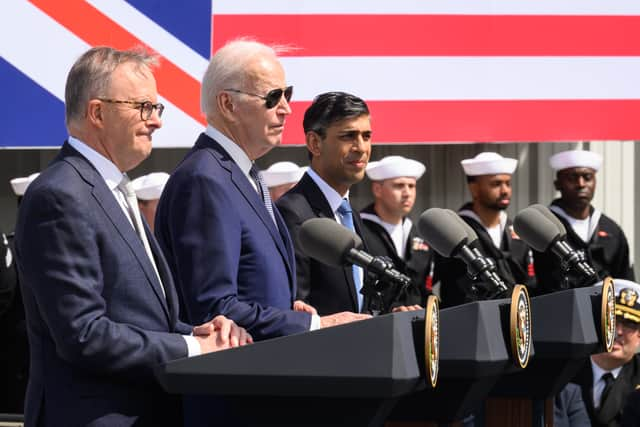Will China invade Taiwan? Tensions and how close the two countries are to a conflict explained
and live on Freeview channel 276
Tensions have continued to rise between China and Taiwan after China criticised a new trade deal between Taiwan and the US.
The U.S.-Taiwan Initiative on 21st-Century Trade aims to simplify customs and investment rules between the US and Taiwan. The agreement is due to be signed on Thursday (1 June).
Advertisement
Hide AdAdvertisement
Hide AdHowever, China has warned against the US signing the treaty with the self-ruled island democracy, which Beijing still makes territorial claims over. Mao Ning, a spokesperson for the Chinese foreign ministry, said: “The United States should stop any form of official exchanges with Taiwan, refrain from negotiating agreements with Taiwan that have sovereign connotations or official nature and refrain from sending wrong signals to the ‘Taiwan independence’ secessionist forces,”
The relationship between China and Taiwan has been frosty for some time, with tensions flaring again recently after China conducted military drills near to the island.
Military drills began on Monday (10 April) and are scheduled to last for three days. Some of those exercises taking place included China "sealing off" Taiwan and simulating targeted strikes.
It comes after Chinese President Xi Jinping said that his country’s military would “modernise” in the coming years.
Advertisement
Hide AdAdvertisement
Hide AdThe leader of the People’s Republic of China (PRC) was recently sworn in for his history-making third term as president. His comments during the annual parliament session came amid fears that China could eventually invade Taiwan, as well as rising tensions with the West, in particular the US.
China and Taiwan have been on opposing sides of a territorial disagreement since the end of the Second World War. China claims that the island is part of the PRC, while Taiwan argues for its sovereignty.
UK Prime Minister Rishi Sunak has warned that China’s aggression over its neighbouring state, along with the war in Ukraine at the hand of Xi’s ally Vladimir Putin, puts the world at threat of a future “defined by danger”. In a foreword of a new foreign and defence policy document released by the UK government, Sunak said: "Russia’s illegal invasion of Ukraine, weaponisation of energy and food supplies and irresponsible nuclear rhetoric, combined with China’s more aggressive stance in the South China Sea and the Taiwan Strait, are threatening to create a world defined by danger, disorder and division - and an international order more favourable to authoritarianism."
While China is ramping up its military and Western leaders speak out against the aggression towards Taiwan, it can seem like the two countries are on the precipice of a conflict over the status of the island. But just how likely is that to happen? NationalWorld spoke to Dr Jonathan Sullivan, an expert in China-Taiwan relations from the University of Nottingham, about the situation.
Is a conflict between China and Taiwan imminent?
Advertisement
Hide AdAdvertisement
Hide AdAlthough Xi has placed emphasis on the modernisation of China’s forces, as well as Sunak’s warning of possible escalations, the chance of any conflict in the immediate future is uncertain. Dr Sullivan explained that despite its military gesturing, China actually seems to be “risk averse.”
“There is no mystery that China, the US, Taiwan, and Japan are all preparing for a hypothetical future military contingency. But that doesn’t mean that kinetic action is inevitable or imminent,” said Dr Sullivan.


“The ball is in China’s court, and the Chinese leadership is risk averse. Even under Xi, who has insisted on a more robust foreign policy posture. The regime cares first and foremost about its own survival and military action against Taiwan comes with great risk.”
China’s hesitancy may be down to the more-than competent defences of Taiwan. It’s these defences that could see any escalation of conflict roll out into a long-term war between the two nations.
Advertisement
Hide AdAdvertisement
Hide AdDr Sullivan continued: “Although the military balance has shifted in China’s favour, Taiwan’s asymmetric defence is pretty formidable. A Chinese invasion would be far from a guaranteed success, and what then?
“China would be faced with a long-term occupation – urban guerrilla warfare against a motivated Taiwanese populace and massive international sanctions. It would be extremely disruptive for the Chinese economy and could easily backfire on the regime, decreasing popular support and endangering their survival.”
So why is China investing in and developing its military prowess if the aim is to avoid a war with Taiwan? The answer may be piling pressure on Taiwan ahead of its upcoming election in 2024, with China already posturing with drills over Taiwanese airspace, following a highly-publicised visit by US House Speaker Nancy Pelosi last year.
“More likely than these kinetic conflict scenarios is an incremental ramping up of non-kinetic pressure on Taiwan, continued preparation for potential kinetic action, and a cold peace punctuated by periodic bursts of action,” Dr Sullivan explained. “Taiwan has national elections in January 2024, which may see the election of a more China-friendly government in Taiwan - it is unlikely to do anything radical before then.
Advertisement
Hide AdAdvertisement
Hide Ad“None of this is to say that things are rosy. US-China relations are in a negative spiral and only a fool or crazy optimist would say there is no chance of military conflict in the future.
“If another DPP (Democratic Progressive Party) government is voted in in 2024 and the trajectory in cross-Strait relations and US-China relations continues, then conflict scenarios will become much more salient and the possibility of a military clash more real.”
What has been the international response to the China-Taiwan situation?
As previously mentioned, China relations with the West are under severe strain. This is no more evident than in its relationship with the US.
Earlier this year, there were spats between the two governments after Chinese balloons were shot out of the sky over North American airspace. Additionally, pressure has been applied on the relationship between the US and China following American concerns on a range of tech issues relating to Chinese phone manufacturer Huawei and China-based social media site TikTok.


Advertisement
Hide AdAdvertisement
Hide AdThe UK has also voiced concerns over the Chinese Communist Party’s “action and stated intent” which could potentially “threaten the UK’s interests”. Both allies have been vocal in their support of Taiwan but have not yet crossed the boundary of overstepping into the situation.
The AUKUS summit, which saw Sunak, US President Joe Biden and Australian Prime Minister Anthony Albanese agree on terms for a new security pact between the three nations, was held in California days after Xi was sworn in for his third term. The agreement will see the UK and the US commit to the development and delivery of nuclear-powered military equipment to Australia for the Indo-Pacific region.
Dr Sullivan said: “The international community, primarily the western democracies, should continue their planning and preparation for conflict and the fallout of a conflict including massive disruption to the global economy and global supply chains. They should continue to offer Taiwan substantive support in ways that does not cross PRC red lines, and they should continue to emphasise the message that Chinese aggression will not be tolerated.”
Which countries recognise Taiwan as a sovereign state?
China has been clear to the world that nations will not be able to have diplomatic relations with both China and Taiwan, and can only have relations with one. Therefore, out of 193 UN member states, only 12 have recognised Taiwan’s sovereign state.
These are:
- Belize
- Guatemala
- Haiti
- Honduras
- Marshall Islands
- Nauru
- Palau
- Paraguay
- St Kitts and Nevis
- St Lucia
- St Vincent and the Grenadines
- Tuvalu
Advertisement
Hide AdAdvertisement
Hide AdThe Vatican City also recognises Taiwan as an independent state.
The US recognised Taiwan as a sovereign state for 30 years after the Chinese Civil War, however this ended in 1979. Despite no longer recognising its sovereignty, the US has continued to have friendly relations with Taiwan which has added to its testy relationship with China in recent years.
Comment Guidelines
National World encourages reader discussion on our stories. User feedback, insights and back-and-forth exchanges add a rich layer of context to reporting. Please review our Community Guidelines before commenting.
